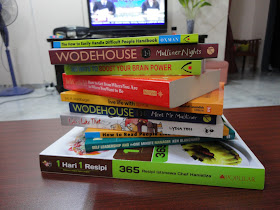What I've learned from this book:
Empowerment is something someone gives you. Self-leadership is what you
do to make it work. Sounds good but this is exactly what's missing. People give me work but they don't give me the empowerment to see it through. Somehow control and power are two things closely related. If you are so used to having power ('position power' according to Ken), I suppose it's difficult to let go. How can I develop professionally if I have self-leadership but no empowerment and trust to make decisions? Yes I can use my 'knowledge power', 'personal power','relationship power' and 'task power' as suggested in the book but unfortunately in schools, EVERYTHING is 'position power' and long live the system!. Power is what people want and enjoy but I'm the dreamy one who still hopes for empowerment and flexibility :) Having said all that, I'm thankful am a Gc without position power because it can lead to abuse if you are not careful.
Diagnose Yourself - love this one! I learned to diagnose myself using the 'development continuum'. There are four levels
D1: Enthusiastic beginner (low competence, high commitment)
D2: Disillusioned Learner (low to some competence, low commitment)
D3: Capable but Cautions Performer (moderate to high competence
variable commitment)
D4: High Achiever (high competence, high commitment)
I don't have to be a D4 in all situations. It can be a mix but what it teaches me is to evaluate my strengths and weaknesses and to do something about them. To quote Ken, "When your competence is low, you need direction: when your commitment is low, you need support.'
Assumed Constraints and Elephant Thinking
I never thought of this one! An assumed constraint is a believe you have, based on past experience, that limits you current and future experiences. Hmmm... I have too many of these I think. What I need to do is challenge assumed constraints. I need to convince myself that 'position power' is not the only power that works.
I will share what I learn from the next book am reading now later...ta










